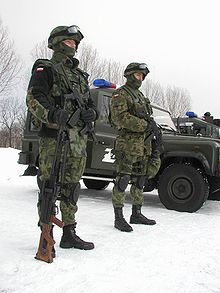Types

LEAs can be responsible for the enforcement of laws affecting the behaviour of people or the general community, for example the New York City Police Department, or the behaviour of commercial organisations and corporations, for example the Australian Securities and Investments Commission, of for the benefit of the country as a whole, for example the United Kingdom’s Her Majesty's Revenue and Customs.
Religious law enforcementedit
A LEA can be responsible for enforcing secular law or religious law, for example Sharia or Halakha. The significant majority of LEAs around the world are secular, their governing bodies separating religious matters from the governance of their subjects. Religious law enforcement agencies, for example Saudi Arabia’s Mutaween, exist where full separation of government and religious doctrine has not occurred, and are generally referred to as police agencies, typically religious police, because their primary responsibility is for social order within their jurisdiction and the relevant social order being highly codified as laws.
Internal affairsedit
Often, a LEA will have a specific internal unit to ensure that the LEA is complying with relevant laws, for example the United States’ Federal Bureau of Investigation's Office of Professional Responsibility. In some countries or divisions within countries, specialised or separate LEAs are established to ensure that other LEAs comply with laws, for example the Australian state New South Wales Independent Commission Against Corruption. LEA internal self compliance units and external LEA compliance agencies coexist in many countries. Names given to LEA internal self compliance units are typically, Internal Affairs, Internal Investigations, Professional Standards.
Police agenciesedit
Many law enforcement agencies are police agencies that have a broad range powers and responsibilities. A police agency, however, also often has a range of responsibilities not specifically related to law enforcement. These responsibilities relate to social order and public safety. While this understanding of policing, being more encompassing than just law enforcement has grown with and is commonly understood by society, it is recognised formally by scholars and academics. A police agency's jurisdiction for social order and public safety will normally be the same as its jurisdiction for law enforcement.
Military law enforcementedit
Military organisations often have law enforcement units. These units within armed forces are generally referred to as military police. This may refer to:
- a section of the military solely responsible for policing the armed forces (referred to as provosts)
- a separate section of the armed forces responsible for policing in the armed forces and in the ministry of defence such as the Żandarmeria Wojskowa
- a section of the military solely responsible for policing the civilian population (such as the Romanian Gendarmerie)
- the preventative police (with military status) of a Brazilian state (Polícia Militar)
The exact usage and meaning of the terms military, military police, provost, and gendarmerie vary from country to country.
Non-military law enforcement agencies are sometimes referred to as civilian police, but usually only in contexts where they need to be distinguished from military police. However, they may still possess a military structure and protocol.
In most countries, the term law enforcement agency when used formally includes agencies other than only police agencies. The term law enforcement agency is often used in the United States of America to refer to police agencies, however, it also includes agencies with peace officer status or agencies which prosecute criminal acts. A county prosecutor or district attorney is considered to be the chief law enforcement officer of a county.
Other responsibilitiesedit
Other responsibilities of LEAs are typically related to assisting subjects to avoid non compliance with a law, assisting subjects to remain safe and secure, assisting subjects after a safety impacting event. For example:
- policing
- social order
- public incident mediation
- pre-empting anti social behaviour
- dangerous event public logistics
- public safety
- general search and rescue
- crowd control
- social order
- regulation
- services and facilities
- disaster victim identification
- education and awareness campaigns
- victim prevention and avoidance
- law compliance
- public safety
Many LEAs have administrative and service responsibilities, often as their major responsibility, as well as their law enforcement responsibilities. This is typical of agencies such as customs or taxation agencies, which provide services and facilities to allow subjects to comply with relevant laws as their primary responsibilities.
Private law enforcementedit
Private police are law enforcement bodies that are owned or controlled by non-governmental entities. Private police are often utilized in places where public law enforcement is seen as being under-provided. For example, the San Francisco Patrol Special Police, which still exist today. It is argued that Private Law Enforcement may serve as a superior alternative to a government monopoly law enforcement.
Regulationedit
Many LEAs are also involved in the monitoring or application of regulations and codes of practice. See, for example, Australian Commercial Television Code of Practice, building code, and code enforcement. Monitoring of the application of regulations and codes of practice is not normally considered law enforcement. However, the consistent non-compliance by a subject with regulations or codes of practice may result in the revocation of a licence for the subject to operate, and operating without a licence is typically illegal. Also, the failure to apply codes of practice can impact other subjects’ safety and life, which can also be illegal.
Comments
Post a Comment